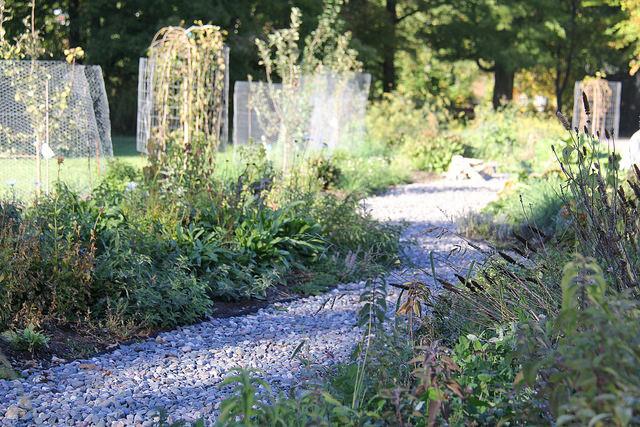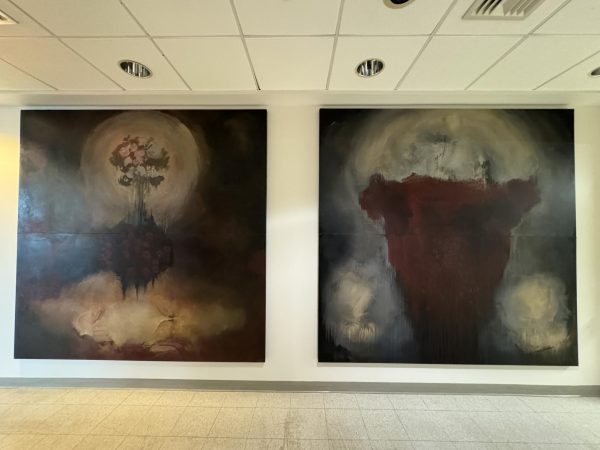Students, faculty build ‘Edible Trail’
The Edible Trail at the Meadville Area Recreation Complex offers students and community members a chance to explore and contribute to their local environment.
Allegheny students and staff have created a trail of edible plants along land owned by the Meadville Area Recreation Complex.
This “Edible Trail” provides food for the community and college students and will be a source of education for students at Allegheny and Meadville schools. Though small in size, it contains more than 100 types of flowers, trees, shrubs and herbs, according to Kerstin Martin, garden manager at Allegheny.
Emma Sonder, ’19, an environmental science major, worked on the trail as an independent study project from this past summer up to the present. Sonder worked under Martin with Gene Frank, ’19, at the Community Garden last year.
Sonder said they picked out plants, designed the trail and purchased and planted seeds over the summer.
The Community Garden is a separate project from the Edible Trail, but resides nearby, allowing residents to claim ownership of soil beds to grow plants of their choice. The garden also serves as an outdoor classroom for schools. The Edible Trail leads the middle schoolers from the Meadville Area Middle School to the garden, providing a learning experience on the way to the trail, Martin said.
Most of the plants are edible, but a few are not. Trail-goers have to make sure they know what the plant is before they pick from them, said Sonder.
Currently, Sonder is working to decide what the future of this project will be. They are making a guide to show what plants there are and how to care for them, and hope there will be other people willing to take over caring and harvesting plants once they graduate.
“The project is supposed to serve as a resource for the community, but also as a resource for the schools to have kind of an outdoor classroom situation for teaching gardening, gardening education and environmental education,” Sonder said.
Sonder said work on the trail is funded through various grants, including the Community Wellness Initiative and the U.S. Environmental Protection Agency grant.
“Allegheny is the fiscal agent [of the Community Wellness Initiative],” Martin said. “But we receive that funding in partnership with the [MARC], Crawford Central School District, the City of Meadville and the hospital, as well as Meadville Medical Center and the county commissioners.”
The idea of the garden and the trail is to build a partnership between the school and some of the major organizations in the city to improve the wellness of Meadville, according to Martin.
“I direct the Community Wellness Initiative, and when Eric Pallant [department chair and professor of environmental science] was developing his junior seminar in 2014, we were talking about what kind of project would be useful to the Wellness Initiative,” Martin said. “That’s when we came up with the idea [for the trail].”
It is hard to say how much funding is needed for the trail because the Community Garden also benefitted from the funding, and because the Edible Trail is not finished yet, according to Martin.
Wellness Programs coordinator Taylor Hinton, ’14, works for the Community Wellness Initiative but did not begin her work until after the Edible Trail planning began.
“My job is to take students from the middle school to the [Community] Garden to do classes so I’m a garden educator,” Hinton said. “We knew students would be walking to the garden a lot.”
Hinton began working with the Community Wellness Initiative by helping facilitate research during her time at Allegheny College. Eric Pallant’s junior seminar took on the work of designing the Edible Trail, according to Hinton. They decided how much space they needed and what could be planted there.
Elia Sherman, ’18, a Bonner scholar under Hinton, began digging for the trail. Sherman used Service Saturdays and organized her own volunteer days to work on the trail and get Allegheny students involved, Hinton said.
Paige Colao, ’17, created a cob bench as her senior project for the trail, according to Hinton. The bench, which is built out of clay and stone, Hinton said, meant to eventually decompose into the earth.
Community Wellness Initiative members run the trail currently, but Sonder hopes to get the community more involved. The trail is meant to create a stronger connection between the community and Allegheny College.
The only maintenance the trail needs right now is pruning before the winter comes, said Sonder. They are looking for volunteers on Service Saturdays to help out.





